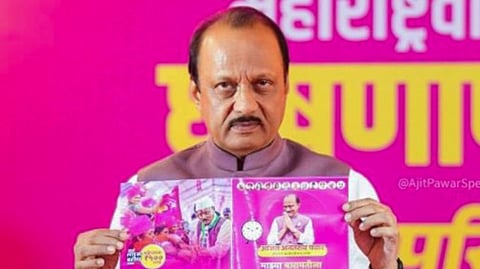Maharashtra assembly election: Counting of votes on Nov 23
Mumbai | Counting of votes in the Maharashtra assembly elections will begin at 8 am on Saturday, with all eyes on the outcome of the battle between the ruling BJP-led Mahayuti coalition and the Maha Vikas Aghadi (MVA) alliance, which is seeking to make a comeback.
The final turnout in the polls, held on November 20, was 66.05 per cent, up from 61.1 per cent in 2019, election officials said.
Counting of votes will also be held for the Nanded Lok Sabha bypoll, where 67.81 per cent voting was recorded on November 20.
Kolhapur district led with 76.63 per cent polling, followed by 75.26 per cent in Gadchiroli, which has some Left Wing Extremism affected pockets, while the lowest was in Mumbai island city at 52.07 per cent. Mumbai suburban district recorded 55.95 per cent polling.
A total of 288 counting centres have been set up for the counting of votes on Saturday, including one for the Nanded Lok Sabha bypoll.
A total of 288 counting observers will oversee each assembly constituency, with two observers assigned to monitor counting in Nanded Lok Sabha bypoll, an official said.
The high volume of postal ballots has led to the establishment of 1,732 tables for postal ballot counting and 592 tables for Electronically Transmitted Postal Ballot System (ETPBS) to ensure a smooth counting process across all assembly constituencies, the official said.
In the Mahayuti alliance, the BJP contested 149 assembly seats, Shiv Sena 81 seats, and the Ajit Pawar-led NCP fielded candidates in 59 constituencies.
In the opposition's MVA combine, the Congress fielded 101 candidates, Shiv Sena (UBT) 95, and NCP (SP) put up 86 candidates.
Parties like Bahujan Samaj Party and the All India Majlis-e-Ittehad-ul-Muslimeen (AIMIM), also contested, with BSP fielding 237 candidates and AIMIM putting up 17 candidates.
The number of candidates this time increased by 28 per cent compared to the 2019 state assembly elections. This year, 4,136 candidates contested, up from 3,239 in 2019 elections.
Among these candidates, 2,086 were independents. Rebels were in the fray in over 150 constituencies, with candidates from the Mahayuti and MVA contesting against their party's official nominees.
There were 1,00,186 polling booths in Maharashtra this time, compared to 96,654 booths in the 2019 assembly elections.
Mumbai police have issued an order prohibiting any assembly of people in 300-metre radius of all the 36 counting centres in the city, which comprises 36 assembly constituencies.
No person, other than an official engaged with the election process or public servant engaged in duty, shall loiter or form any assembly within 300 metres radius from any counting centre, a police official said.
The order is effective from 6 am on November 21 till midnight on November 24.
Ahead of the counting of votes, a poster in Pune depicting NCP chief and Deputy CM Ajit Pawar as the next chief minister was put up by a local party worker and was later removed.
The majority mark in the 288-seat Maharashtra Assembly is 145, the number any alliance or party needs to crack to be able to form government in the state.
The term of the present state assembly ends on November 26.
While most exit polls predict a victory for the Mahayuti alliance, three suggest that neither the Mahayuti nor the Maha Vikas Aghadi would secure a decisive majority to form the next government in Maharashtra.


